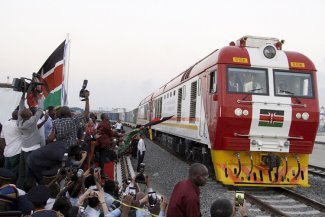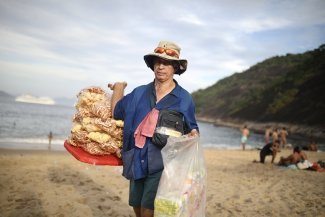The Chinese ambassador to Syria, Feng Biao (right), and the Syrian health minister, Hassan al-Ghabash (second from right), pose in front of a shipment of aid donated by China, including Sinopharm Covid-19 vaccines. Image taken at Damascus International Airport on 24 April 2021.
As suggested in a report by the International Federation of Journalists, the Chinese authorities have used the outbreak of the Covid-19 pandemic as an opportunity to improve their global image. Be it through the donation of health material or the signing of cooperation agreements in the context of the fight against the pandemic, China’s ‘health diplomacy’ – or, more recently, ‘vaccine diplomacy’ – is broadening its influence in various regions of the world, including the Middle East and North Africa (MENA), an area Beijing considers key to its much longed-for rise to global superpower status.
In early 2020, when Wuhan’s hospitals became overstretched, several MENA countries immediately sent medical supplies, in a show of solidarity with China. But as the months went by and the emergency shifted from one continent to the next, the aid travelled back in the opposite direction. Beijing sent protective equipment and teams of epidemiologists to the worst affected countries in the region, such as Morocco, which received four planes of aid, including respirators.
During the first quarter of 2021, Beijing managed to score points in the region by supplying vaccines developed and made in China whilst Europe and the US only seemed to be concerned about supplying their own citizens. Most countries in the MENA region have now received shipments of Sinopharm and Sinovac, the two main Chinese vaccines, some as donations and others procured. Morocco has received as many as 9.5 million doses and Egypt 4.15 million.
Egypt and the United Arab Emirates have signed deals with China for the domestic production of its vaccines, with annual capacities of 80 and 200 million, respectively, and are to serve as regional hubs from which the African continent will be supplied. In July, they were joined by Morocco, with a production capacity of five million doses per month. Not wanting to be left behind in the ‘vaccine diplomacy’ drive, in June, US president Joe Biden announced the donation of 500 million doses to the poorest countries through the multilateral COVAX programme, but no technology transfer.
“China has improved its image in the MENA region, especially relative to Western countries. Not only has it been perceived as more supportive but also more effective in dealing with the pandemic,” Naser al-Tamimi, a researcher at the Italian think tank ISPI, tells Equal Times. According to various polls, opinion of the Asian giant was already more positive than that of other major global powers before Covid-19. Half of Arabs, according to an Arab Barometer survey, were in favour of closer ties with China, whilst less than 40 per cent were in favour of closer ties with the US or Russia. “Some elites, and some specific groups, like the Islamist movements, are wary of China because of its values or the way it treats minorities. But this idea doesn’t stretch to the majority of the population,” says al-Tamimi.
Uyghurs,Taiwan and the principle of neutrality
Over the past three decades, during China’s ascension towards global superpower stature, it has steadily strengthened its presence in the MENA region, especially in the economic sphere, often to the detriment of Western powers. In 2020, China displaced the European Union as the Persian Gulf countries’ main trading partner. And it did so not only thanks to its oil transactions (although 44.8 per cent of the crude oil Beijing buys comes from the Middle East) but through the New Silk Road project, an ambitious infrastructure programme under which Beijing has already signed contracts worth more than US$123 billion (around €103.5 billion) in the region within the last six years. In Saudi Arabia alone, it doubled its investments in 2019.
Initially, the Chinese regime’s almost sole interest in the region was to guarantee the flow of oil needed to sustain its voracious growth, which has also been a pillar of US foreign policy in the region for decades. More recently, however, Beijing has been broadening its interests and objectives, as demonstrated by the opening of Chinese cultural centres in almost all MENA countries and the signing of several strategic partnership agreements – the most comprehensive with Algeria, the United Arab Emirates, Egypt and Iran – including coordination on international policy issues. “One of the reasons the region’s leaders look favourably on China is that, unlike Western powers, it does not meddle in domestic issues, such as respect for human rights, or give lessons in democracy,” explains international relations expert Bechir Jouini, from Tunisia.
For Beijing, the principle of non-interference in internal affairs is sacred, and should apply in both directions. For MENA governments, this means ignoring a sensitive issue: the terrible repression of the Muslim Uyghur minority. “China uses its economic power to influence the position of Middle Eastern countries on the Uyghur question. Even Turkey, which has linguistic ties with Uyghurs, has changed its position and does not denounce the repression like it used to,” Zumretay Arkin, campaigner for the World Uyghur Congress, tells Equal Times. “And as almost all governments in the region are dictatorships, this alliance with Beijing is convenient, as it covers their backs in the UN,” she adds.
The other issue that the Chinese authorities regard as ‘internal’ is its relationship with Taiwan, an island it considers to be under Chinese sovereignty. Non-recognition of the island’s independence is a prerequisite for cooperation agreements with China, including participation in the New Silk Road project.
The other mainstay of China’s policy in the region is the promotion of economic development as a tool for resolving political conflict and fostering political stability. This approach has enabled it to develop close ties with countries in conflict, with both Israel and Palestine, for example, or Iran and Saudi Arabia. Its relationship with the latter offers a clear illustration of the case in point. Along with Algeria, Beijing’s main allies in the region are the Emirates and Saudi Arabia. This has not, however, prevented it from developing close relations with Iran. During the harshest phase of US sanctions, the Iranian economy was able to stay afloat thanks to Chinese oil imports. Between 1981 and 2019, China was also Tehran’s second largest arms supplier after Russia. This year, the two countries signed a 25-year multi-sectoral agreement that will place Chinese businesses in a privileged position.
For the moment, China’s increasing foothold has not led to a decline in labour rights or environmental standards in the region, where they are also very limited, issues some European multinationals have long been citing as the reason for relocating their factories. “China’s arrival didn’t create concerns about losing rights but people have been complaining for some years now about losing job opportunities as many Chinese workers have come to build infrastructure projects” and other works, al-Tamimi notes. To build the Great Mosque of Algiers, the third largest in the world, for example, some 4,000 Chinese workers were brought into the country. “Chinese diplomats always now stress the social corporate responsibility of their companies,” adds al-Tamimi. In other words, Beijing’s representatives avoid any reference to the impact on the local workforce, emphasising, rather, the positive impact of Chinese investments on the economy and the local population.
Although low profile, the Chinese regime has been steadily increasing its political and security footprint in the MENA region. It has a military base near the Persian Gulf, in Djibouti, for example. Some experts, such as Karim Sadjadpour of the Carnegie Endowment for International Peace think tank, question whether, as China consolidates its superpower status, it will be able to maintain its policy of neutrality much longer. The West is particularly concerned about its control of some key infrastructures in the region, such as ports or the 5G network, installed by Huawei in several countries. And a US congressional report warns of the possible transfer of surveillance technologies through the New Silk Road project.
“There is competition between China and the traditional powers in the area, such as France. It’s not easy to generalise when analysing what will happen in the future, because there are countries with stronger or weaker ties with China and the West. But if the West were to call for an economic blockade of China, I don’t think Arab countries would follow it. The interests established are already too strong,” concludes international relations expert Bechir Jouini.













